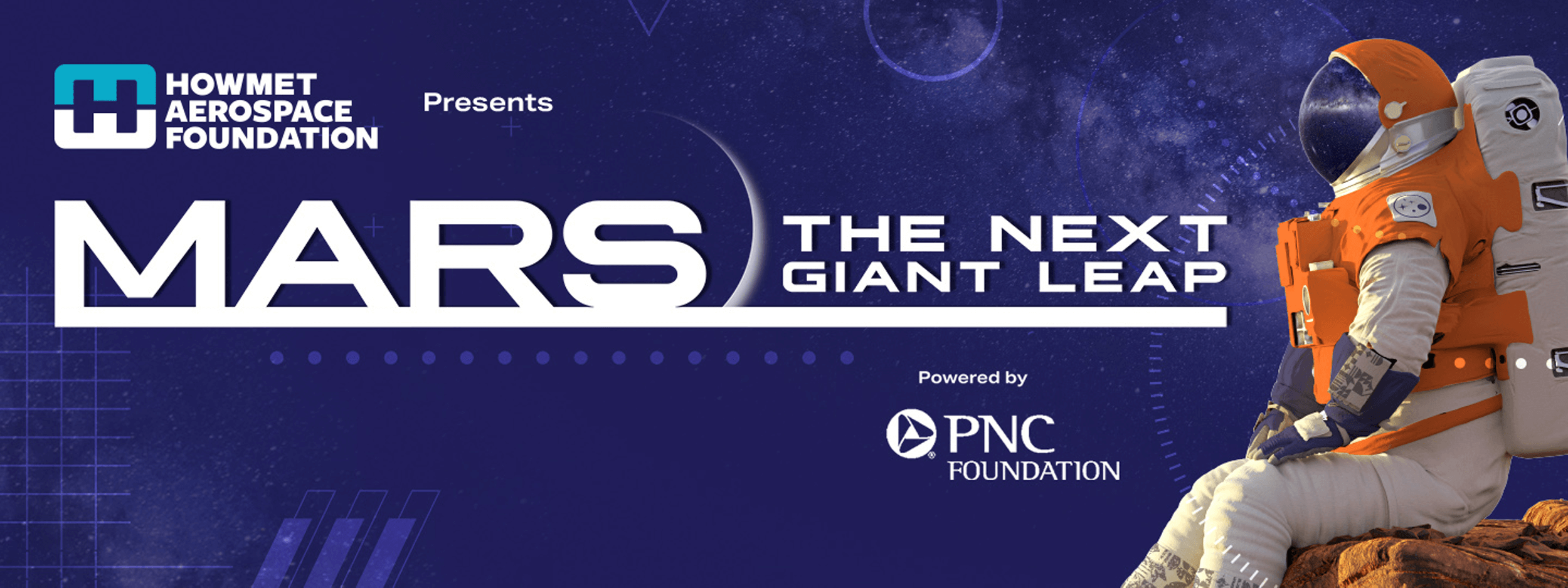
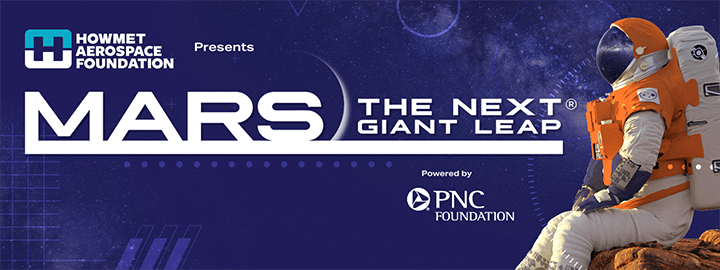
Mars: The Next Giant Leap®
Now open! Included in general admission
Embark on an immersive voyage, imagine a better future on a different planet, and discover what is needed to make that future a reality on Earth. The new, groundbreaking exhibition Mars: The Next Giant Leap®, with lead support by Howmet Aerospace Foundation and the PNC Foundation, launches you on a 300-million-mile journey to Mars where you will learn the many facets of space exploration. Visitors of all ages will explore relevant, contemporary issues that surround space exploration such as: How do we establish a new society on Mars? Who gets to go to Mars? What does governance look like? How do we sustain life there? You will discover why we should explore other worlds when our own is in trouble. Humans have made it to the Moon and now the next giant leap is Mars.
This groundbreaking permanent exhibition gallery adjacent to Buhl Planetarium is the most ambitious new experience in Carnegie Science Center’s history. With input from the community and guided by the principle that space is for all, ignite your imagination and become a voice for the development of a Martian settlement.
Through this 7,400 square-foot Mars exhibit and its supporting programs, you will explore how the issues of sustainability, climate change, social justice, and equitable access to resources can shape humanity’s future. The Science Center surveyed the local community and professionals in the industry to ensure relevancy and excitement for all.
Visualize a human settlement on the Red Planet
Imagine what a Martian dwelling can look like and think about how to prioritize resources. Learn what foods are best suited to the climate and desirable to grow, and how the technology developed to meet these needs is invaluable to life on Earth.
Vote on the future of a Mars settlement
Creating a better future on Mars and on Earth requires including many different voices in the conversation. Collectively vote on what to build on Mars and see how your decisions affect many other aspects of daily life.
Explore issues on Earth through the lens of Mars
Learn what is takes to survive and thrive in Mars through a series of hypothetical climate-related scenarios. Look at how scenarios impact both Mars and Earth to make connections on how we can work through climate change on Earth.
See yourself in a space career
Uncover the impact the Pittsburgh region has and is having on space exploration. Pittsburgh is poised to be a hub in the growing space economy, and space is not just about astronauts and rocket scientists. From botanists to artists, and manufacturers to lawyers, visitors will see that there are many pathways to careers in the space industry and some of them start in Pittsburgh!
Continue the conversation
The exhibit sparks dialogue that speaks to visitors’ values during their visit and after. Keep the conversation going to further explore relevant, contemporary issues that are important to you.
Explore the Experiential Zones
View from Mars | Climatology | Martian Garden | Martian Living | Dream Big: Space | Pittsburgh in Space | Search for Life
View from Mars
Generously Supported by Arconic Foundation
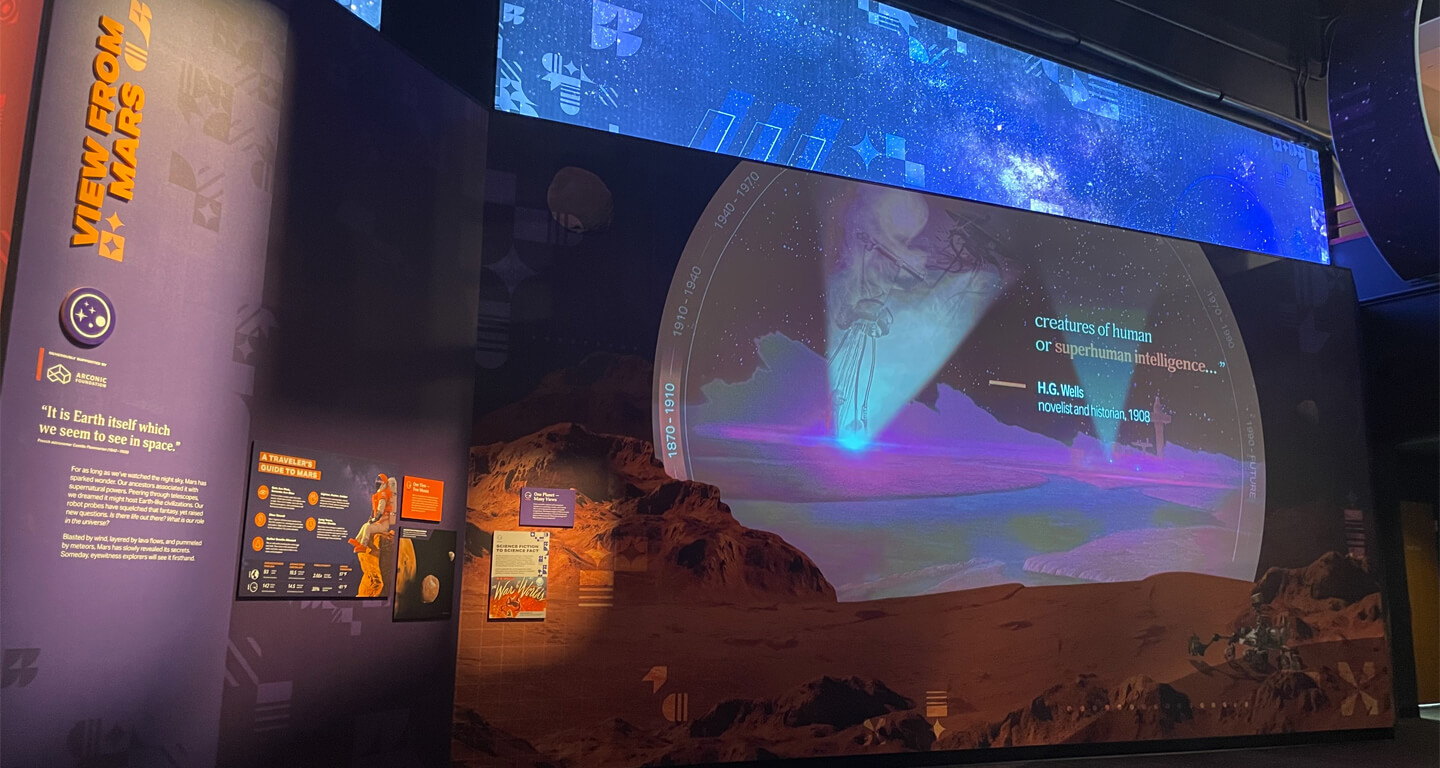
Catch a glimpse of dramatic, large-scale images of the Martian landscape and a perspective of Earth unlike any ever seen before. Delve into the sights and sounds of Mars beneath a beautiful Martian sky and discover how much can be learned by looking with a whole new perspective. A large-scale projection immerses guests in historic visions of Mars. As the story progresses through time, scenes grow increasingly realistic to illustrate how our understanding of Mars has solidified over time.
Climatology
Generously Supported by The Bozzone Family Foundation
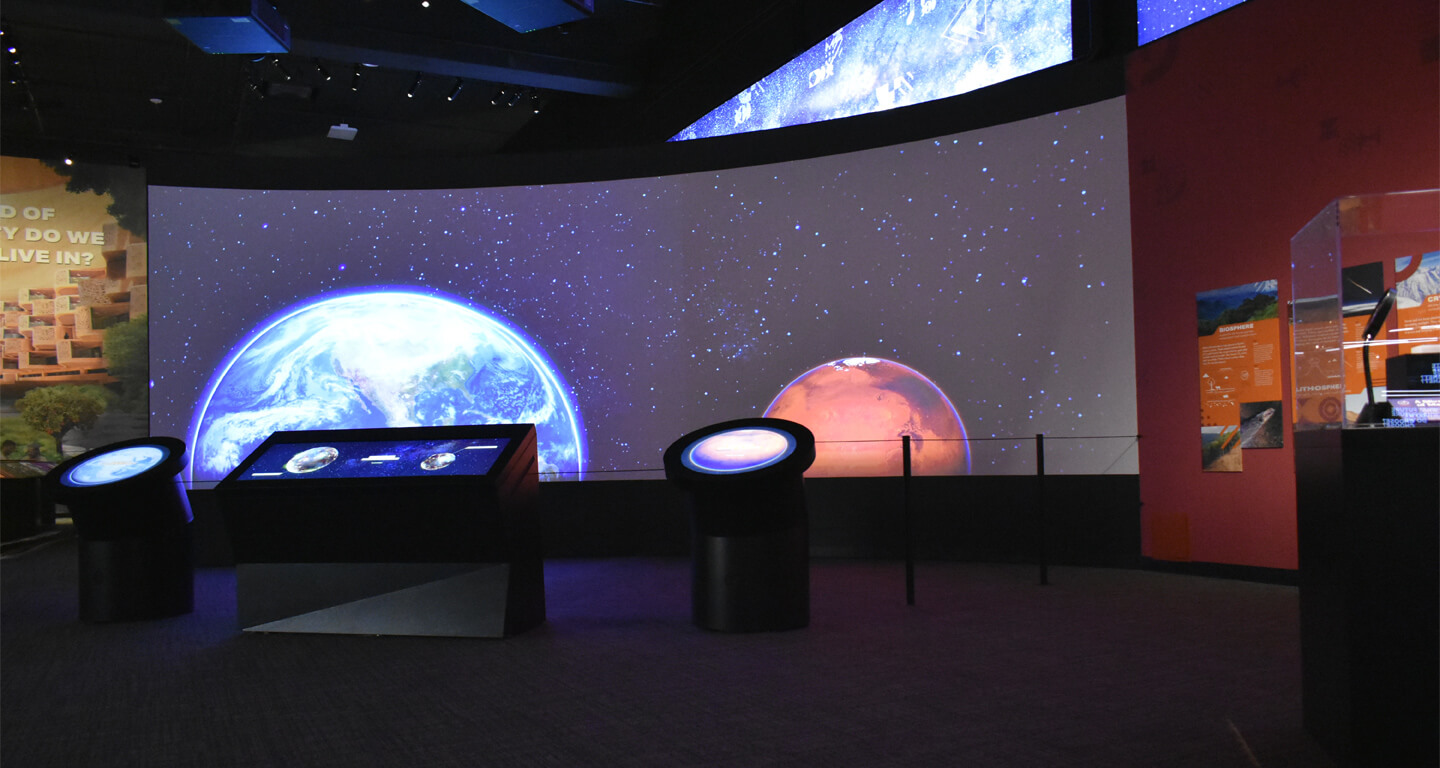
Uncover how climates produce the conditions for life to arise or die out through a fun, large-scale digital gallery exclusive to the Science Center. Explore a variety of hypothetical scenarios that would impact the climate systems of either Earth or Mars on 30 ft. x 16 ft. screens using custom digital control stations. Create and test hypotheses, make connections between the two planets, and consider the planets’ abilities to sustain life under vastly different conditions. Climatology is home to a Mars rock, a rare Martian meteorite that likely made its way to Earth as impact ejecta. Compare this Martian rock to rocks we find on Earth.
Martian Garden
Generously Supported by Henry L. Hillman Foundation
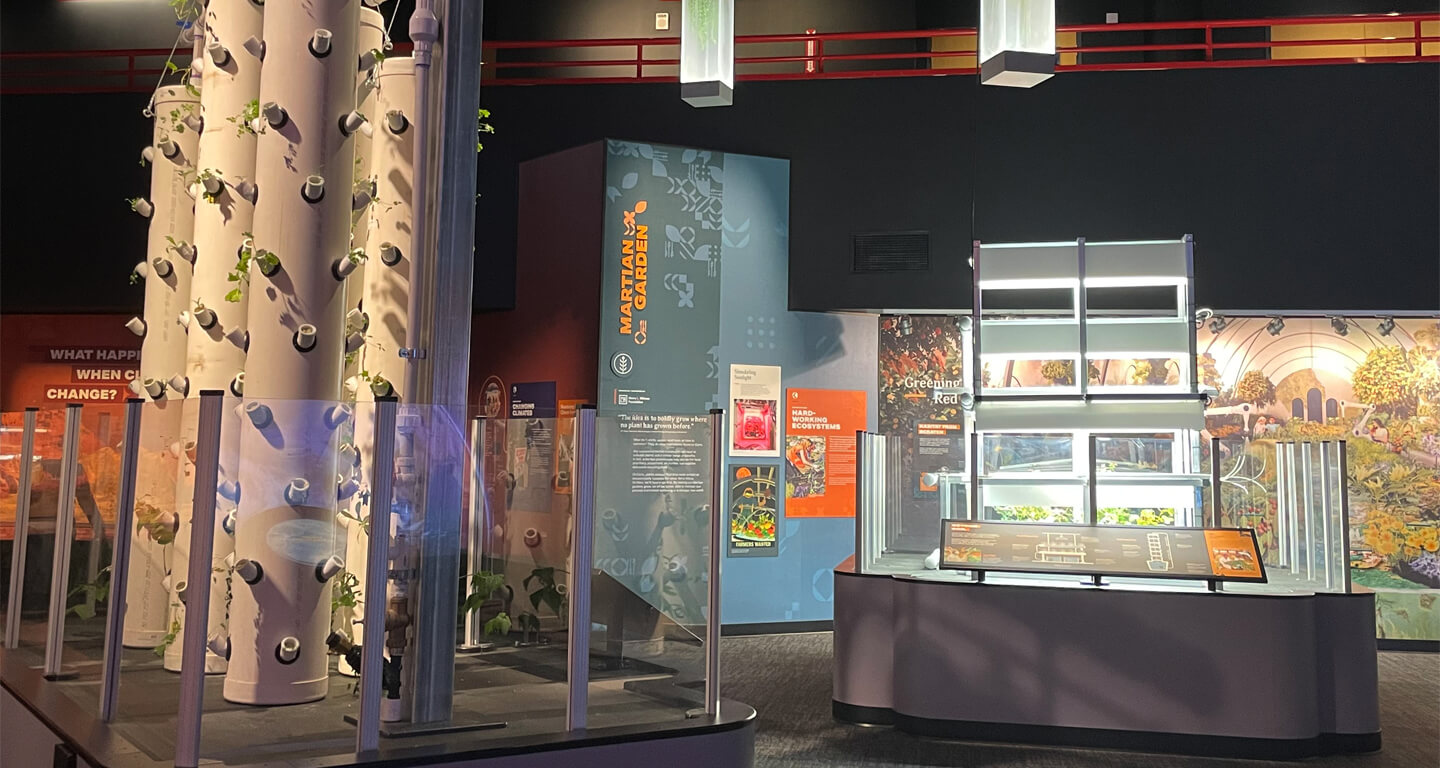
See green on the Red Planet! Sustainability and the management of resources is vital to survival on Mars as humans will not be the only life on the planet. Investigate ways to nourish both body and mind. Reimagine ways to grow food and translate a selection of popular Earth dishes to recipes that can be prepared and enjoyed by the inhabitants in a Martian settlement. Live plant pods will tie together potential methods of growing food on Mars and how we might use these same methods to feed ourselves – ethically and sustainably – on Earth. A total of three Pods will introduce visitors to Soilless Growing, Soil Growing, and Biotechnology on Mars.
Martian Living
Generously Supported by The Philip Chosky Charitable and Educational Foundation
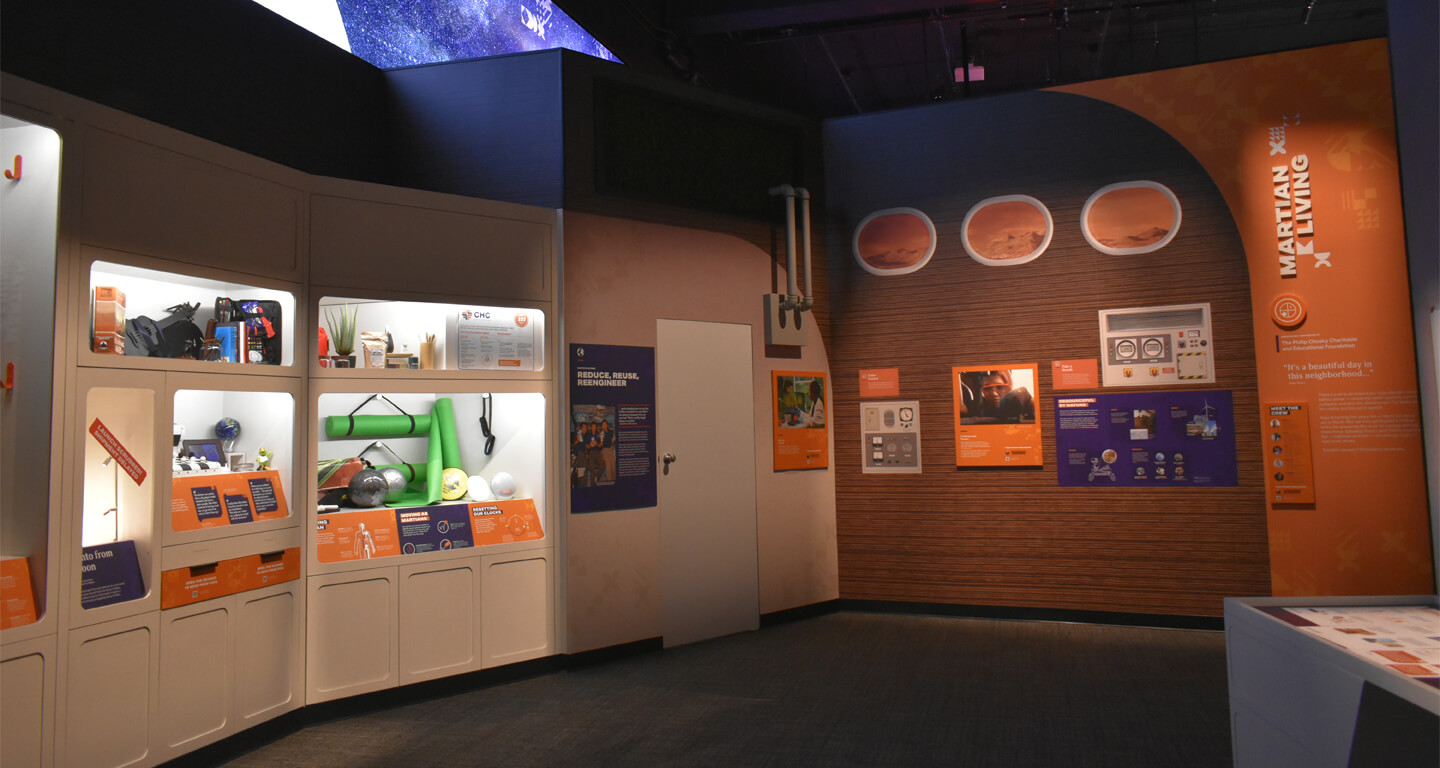
Imagine what daily life on Mars might be like by exploring the living space of a future Martian resident. The interactive zone is the first ever to feature tactile displays that highlight how technology built to support life on Mars might already be impacting our lives today. NASA reports that to develop a settlement on Mars, we must first establish a base on the Moon. From Earth to the Moon, to Mars! Learn more on this webpage.
This area also is home to a moon rock, on loan from NASA.
Dream Big: Space
Generously Supported by The Rossin Family Foundation
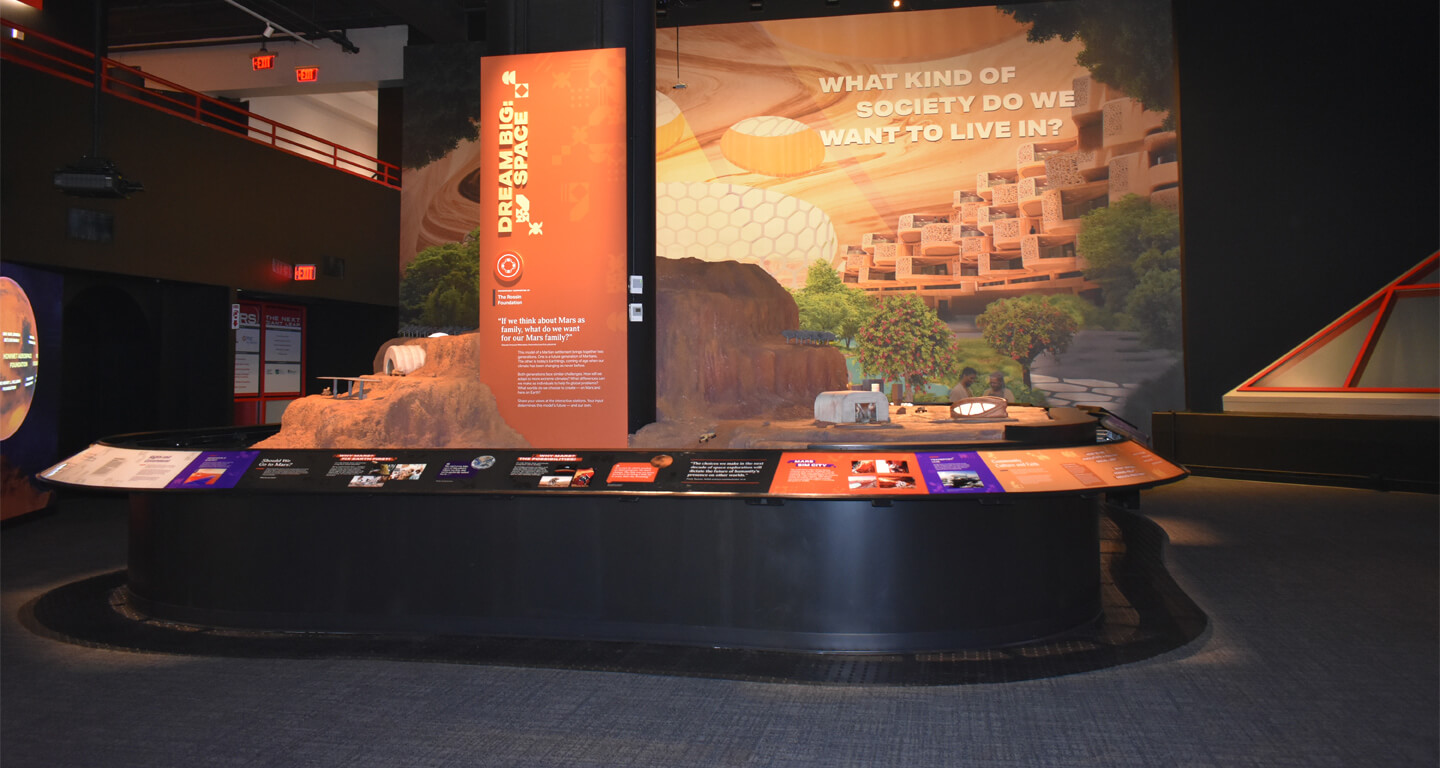
Consider and weigh in on decisions facing an imagined Martian settlement and see the impact of your decisions in digital and analog ways. A model of the settlement in the center of the exhibit is built over time to reflect the guests’ collective decisions, allowing you to see their own thoughts literally shape our future on Mars. Your input will be reflected immediately on a digital model and on the physical model over time. Surrounding the model are interactive stations with questions and activities.
Pittsburgh in Space
Generously Supported by Ray and Joneen Betler
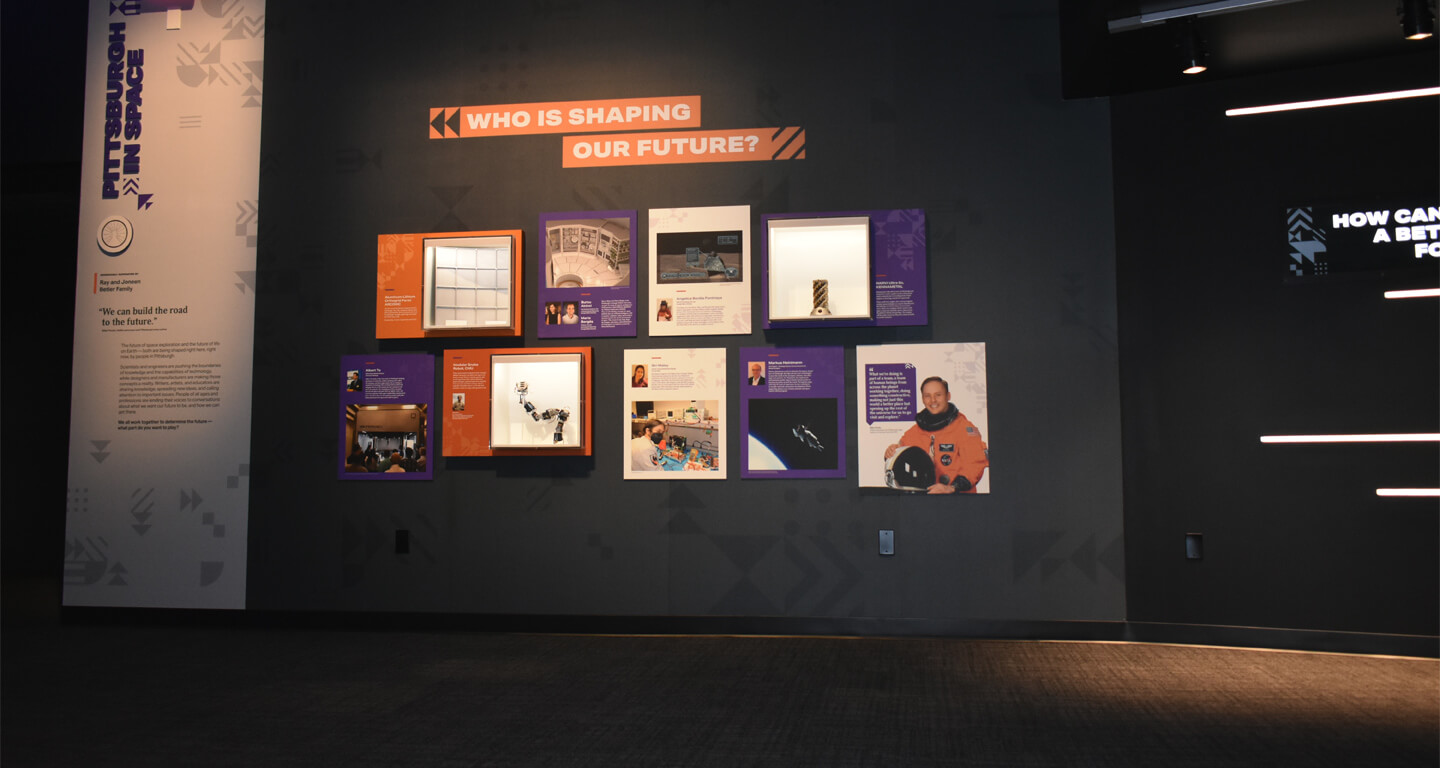
Envision the exciting promise of humanity’s future in space, and the cutting-edge research and big picture ideas that will get us there. Learn about the first steps toward humanity inhabiting Mars happening right now in the Pittsburgh region, the impact local space research has already had, and plans for the future.
Search for Life
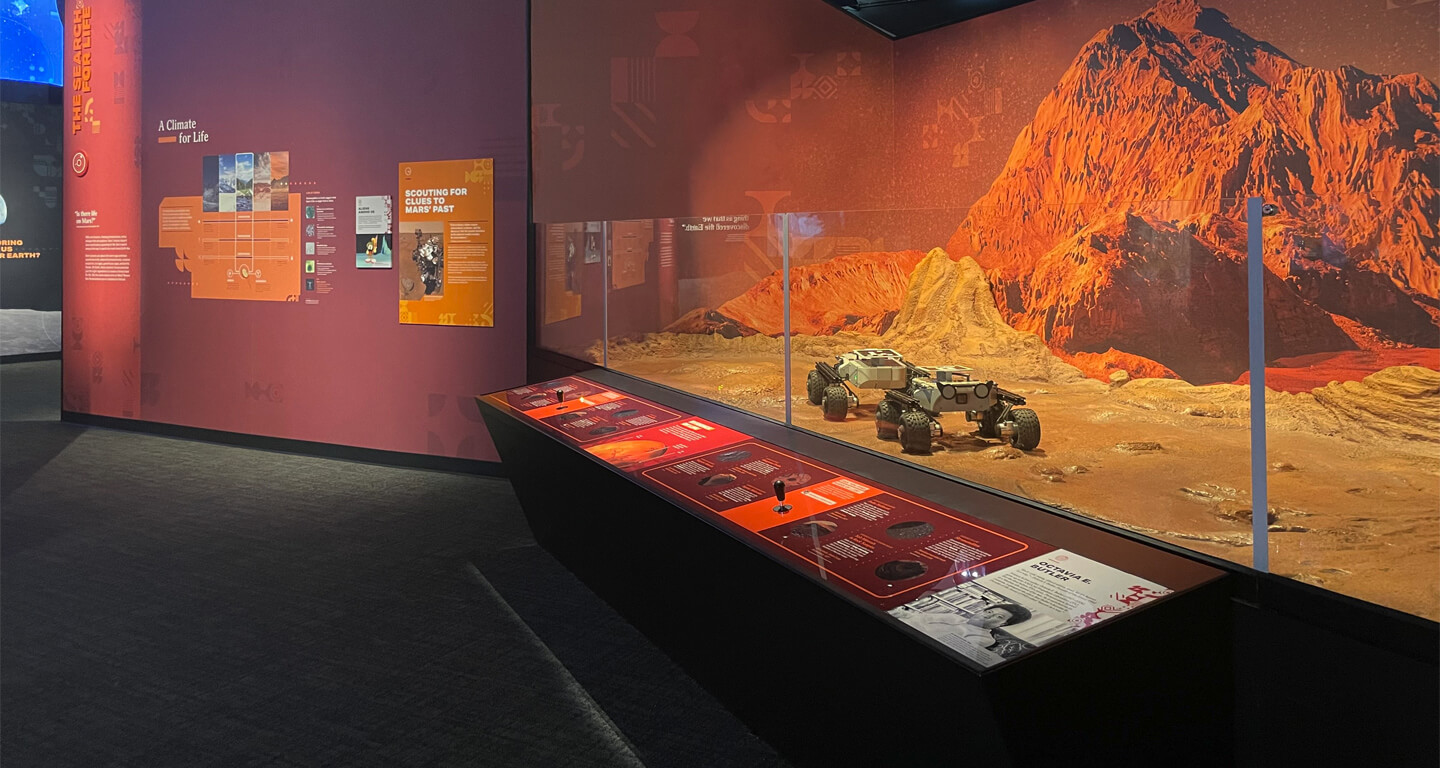
Did you know Mars, the Red Planet, once had a climate like Earth’s? That is precisely why we are looking for signs of life there. Control Martian rovers (just like ones on Mars’ surface, today!) to seek out various signs of life and water. Also make connections to how life impacts climate.
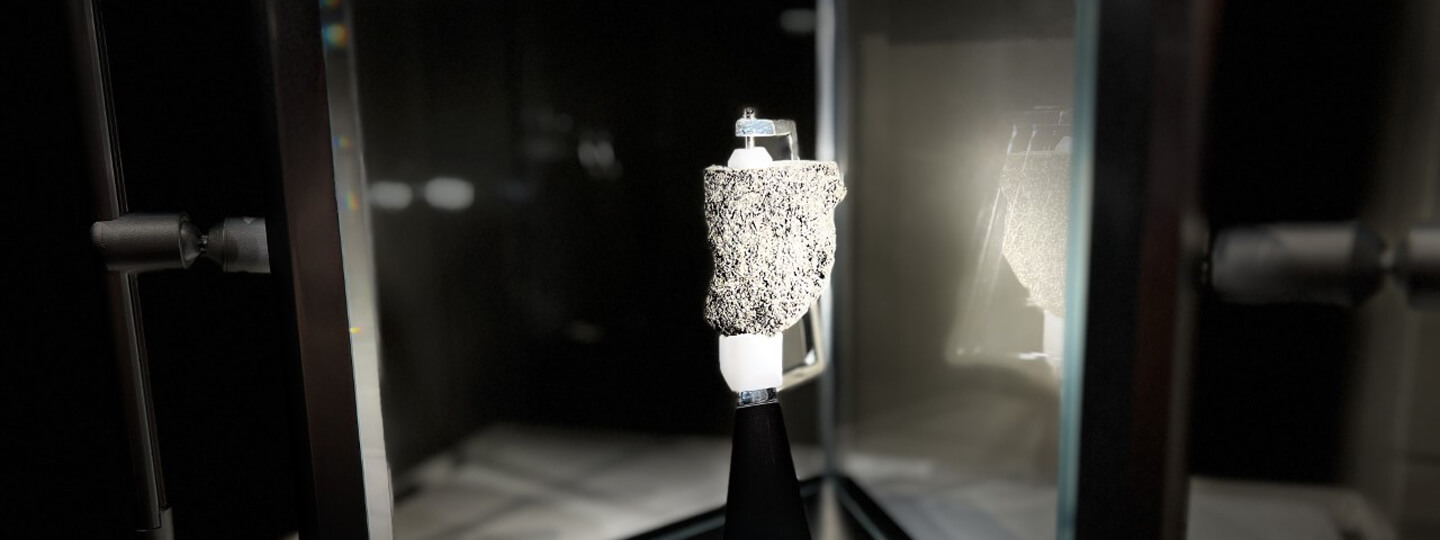
Moon Rock Touched Down in Martian Living Zone
In addition to observing a sliver of Mars, you can now see a Moon Rock on display in Martian Living, generously supported by The Philip Chosky Charitable and Educational Foundation. Carnegie Science Center received Lunar Sample 15499, weighing 74.224 grams on Wed., Dec. 14. It is on loan from NASA Johnson Space Center in Houston, Texas.
Crew members of Apollo 15, the fourth human landing on the Moon, collected the sample from the top of a meter-sized boulder at Station 4 on the rim of Dune Crater in 1971. The Moon Rock is vesicular lunar mare basalt with a porphyritic texture.
Pittsburgh’s acquisition of the Moon Rock perfectly coincided with the conclusion of NASA’s Artemis I mission to the Moon. NASA’s Orion spacecraft splashed down in the Pacific Ocean after its 25.5-day mission on Sun., Dec. 11.
Experience enhanced exhibition programming
With this exhibition, the Science Center leverages assets like the Buhl Planetarium and Rangos Giant Cinema, and its vast array of STEM programming that targets career readiness. Far from a stand-alone experience, the exhibition amplifies the learning happening in camps, classes, assembly programs, workshops, and evolving slate of STEM education and career readiness initiatives. Additionally, we encourage guests to explore Moonshot Museum, one of our neighbors on the North Shore, to dive deeper into space exploration and watch the real-time assembly of a lunar spacecraft.
The Science Center connects science and technology to everyday life and meets the challenge of building the STEM identity of students by creating and supporting pathways, programs, and exhibitions. These experiences allow new audiences of young people to see themselves as activists, makers, inventors, healers, and thoughtful connectors in the science, technology, engineering, and mathematics fields. The new, groundbreaking exhibition Mars: The Next Giant Leap®, with lead support by Howmet Aerospace Foundation and the PNC Foundation, encapsulates these values.
General Admission
General Admission includes Miniature Railroad & Village®, Mars: The Next Giant Leap®, Highmark SportsWorks®, four floors of interactive exhibits, live demonstration shows, planetarium astronomy shows, and the USS Requin (SS 481). We ask that all visitors (including Members) to secure your tickets online in advance of arriving. There is no surcharge for online ticket purchases.
Self-guided tours of the USS Requin (SS 481) are included with General Admission on a first-come, first-served basis, and are subject to availability. Tours operate at a 20-minute interval with a limited capacity. Timed tickets are required and can be obtained on the day of your visit at the Requin Gateway on the Ground Floor. Full mobility is required for this experience.
Please note: Tickets are being sold up to four weeks in advance. If you would like to purchase your tickets more than four weeks in advance, please call 412.237.3400 between 9 am and 5 pm and our team will assist you.






